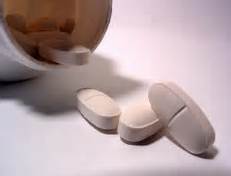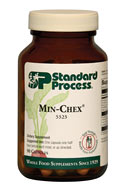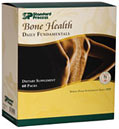What Makes Calcium Supplements
Potentially Dangerous
Potentially Dangerous

|
Adelle Davis |
Calcium is one of the most popular dietary supplements on the market, largely because of the widely circulated belief that regular supplemental doses of this mineral are essential for building and maintaining healthy bones. As a result, many people believe that taking a calcium supplement is one of the best if not an essential strategy to prevent bone fractures resulting from osteoporosis.
However, it's becoming increasingly clear that while organically-bound calcium from your diet is beneficial, isolated synthetic calcium supplements, e.g. calcium carbonate, calcium citrate, etc., may dramatically increase heart attack risk, and other health problems.
A recent study published in the journal Heart found that people who took calcium supplements regularly had an 86 percent greater risk of having a heart attack. Dietary calcium, on the other hand, had no such risk! In fact, those who got their calcium exclusively from synthetic supplements more than doubled their risk of a heart attack compared to those who took no supplements.
A similar trend has been seen for kidney stones, with people taking calcium supplements at a greater risk, while those who consume a high level of calcium in food at a reduced risk. There have been a number of studies that indicate calcium supplements increase your risk for cardiovascular incidents and other problems, as well as NOT being of much benefit to your bones.
A 2010 article presented evidence for a total lack of support in the research for calcium supplements reducing fracture risk. A 2007 study showed that calcium from dietary sources has more favorable effects on bone health than calcium from supplements in postmenopausal women.
Your body does not make calcium, and in fact loses this important mineral daily through your skin, nails, hair, sweat and elimination, which is why you must replace it on a regular basis through dietary sources.
Due to the fact that about 99 percent of your body's calcium is stored in your bones and teeth, if you don't get enough calcium, your body will use the calcium reserves in your bones to perform vital metabolic functions. This is where the idea that supplementing with calcium could prevent calcium loss from your bones comes from, but it is an overly simplified theory that lacks solid evidence to back it up, especially in Western, modernized cultures, which consume unprecedentedly large amounts of dairy-derived, fortification-based and supplemental calcium.
The truth is that taking any calcium in excess or isolation, without complementary nutrients like magnesium, vitamin D and vitamin K2, which help keep your body in balance, can have adverse effects, such as calcium building up in coronary arteries and inducing heart attacks, kidney stones, gallstones, osteoarthritis, hypothyroidism, obesity and type 2 diabetes. Even taking calcium with vitamin D does not appear to be sufficient to prevent these types of adverse effects.
So when you take a biologically foreign form of calcium, such as limestone, calcium carbonate, calcium citrate or when your body's ability to direct calcium to the right places becomes impaired (as when you are deficient in vitamin K2), calcium may be deposited where it shouldn't be, which can lead to multiple health problems, including heart attacks. Many believe that arterial plaque is simply a buildup of cholesterol. But in reality, more than 90 percent of these fatty plaques are calcified. Cholesterol is soft and waxy and does not impair the elasticity of your arteries. But calcium deposits are like concrete, "hardening" your arteries and impairing their ability to expand. It is calcium, not cholesterol, which induces arterial stiffness.
This is particularly important for postmenopausal women, because hormone balance is necessary for proper calcium signaling - directing your body to deposit calcium into your bones. When hormones fall out of balance, this signaling causes calcium to slowly exit your bones and become deposited in your arteries instead. This is why your risk for heart disease can jump substantially with the onset of menopause.
It's more likely your body can use calcium correctly if its food-based calcium or whole food supplements. Good food sources include:
- Organic grass fed raw milk and cheese from pasture-raised cows
- Leafy green vegetables
- Carob
- Sesame seeds and wheatgrass
Calcium from dietary sources is typically better absorbed and utilized than calcium from isolated mega dose supplements. It is also vital to remember that magnesium, along with a variety of additional trace minerals such as strontium, boron, and the other crucial vitamin K2, may all be every bit as, if not even more important than calcium.
A vitamin supplement was designed to supplement the nutrients we are not getting due to the manufacturing process. They are not meant to force the body to do something. But unfortunately they are being used today like pharmacological agents to force an effect. That's not what supplementing is supposed to do. So, if the purpose of a vitamin supplement is to supplement the missing nutrients required to build a healthy body, what should the supplements contain? I can answer that in one word.
Foods heal; chemicals have side effects like any other drug. If you want to be well, take
supplements made from concentrated foods without chemical additives, processing agents, sweeteners or coatings which are generally difficult to digest. Supplements are for nutritional healing. They are intended to restore the lost nutrients removed from our foods. If used correctly, they are supposed to heal the body. They are to provide the raw materials needed by the body to build, repair and function. The body has an innate intelligence. It knows what it needs to do. We don't have to direct it to heal a cut, make the heart beat or perform the hundreds of biological functions necessary to survive. Give the body the nutrition, and it will do what it knows to do.
You see, when you take a whole substance, you get all the known and the unknown nutrients in it. According to Holly A. Carllng, O.M.D., LAc. Ph.D. there are over 2,500 nutrients known to man. We've only been able to isolate about 150 of them. What happens to the other 2350 nutrients? If you take an apple, you will find about 424 nutrients in it; in a carrot you will find about 247 different nutrients in it. Those are only two foods. What about the myriad of other foods? What we know about nutrients is that they depend on synergism. There are co-factors necessary for the nutrient to work properly, a synergism. Synergy means that the sum is better than its parts. That where one plus one would normally equal two, with synergism, one plus one may equal 4 or 8 or 1600! In our infinite wisdom, we cannot possibly duplicate the synergism of nature. It's simply impossible.
So why would we think that we can take a few isolated nutrients in the man-supposed theory of what we need, create it chemically and expect it to replace lost nutrients in our body and therefore lost function? When you take a supplement of man-decided-upon nutrients and individually put it in a pill, you are missing an incredible array of other nutrient co-factors - known and unknown. Just because we can't isolate them, doesn't mean they have no value in the body.
Synthetic or fractionated supplements will not increase your health and harm you because they are foreign for the body. Supplements are designed for nutritional healing, but synthetic supplements create a drain on the body. It takes more nutrients away from the body to deal with the synthetic junk, than what it provides. Chemicals can't build a healthy body; it's just physiologically impossible. Drug-like responses are all you can expect from synthetic or fractionated supplements. They will not heal or support bodily function. They will only help you initially to "feel better". This is because the fractionated vitamin, containing only a fraction of the whole nutrient will search your tissues looking for the missing fractions, and then pull them out, in order to complete the complex. Initially, this will make you feel better, however, long term it will leave you more depleted than you were before you started taking the supplement. The vitamin supplement literally stripped your reserves!
That is why calcium synthetic supplements are not beneficial to our body. On the other hand, whole food calcium supplement is alive and has all synergists to do the job. That is why I recommend to my patients the whole food supplement
Calcium Lactate made out of greens,
Calcifood,
Biodent and others made from cold-processed raw bone meal. Don’t confuse steamed bone meal and cold-processed raw bone meal, the differences are significant. Steamed bone meal is a dead substance, no biological life (enzymes). Calcifood and others is biologically active through careful cold processing.
by the Food & Drug Administration.
These products are not intended to diagnose, treat, cure or prevent any disease.












